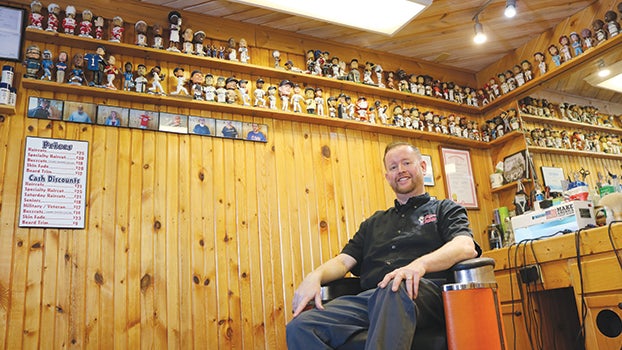‘Punk Rock Rag Doll’ defeats obstacles to break mold of female wrestling
Published 11:16 am Thursday, February 26, 2015
Having a rough night in the ring, professional wrestler “Heidi Lovelace — The Punk Rock Rag Doll” is living up to her name, her opponent tossing her around like a child’s toy.
She reaches out to the crowd, hoping for some cheers to pump her up. What she sees instead provides more motivation than clapping or shouting ever would.
In the front row, a little girl is holding up a homemade poster that simply reads, “Heidi is my hero.”
For Michiana native Dori Prange, moments like these are the highlight of her career.
“It makes it all worth it,” the 2009 Brandywine graduate and Edwardsburg native said in a phone interview on the way to a show.
While still a student at Southwestern Michigan College, Prange got her start in wrestling when she visited a benefit for pancreatic cancer with some old friends who were wrestling fans.
“I saw two women doing it and thought, ‘wow, they’re doing a good job,’ but I knew I could do it better. I thought, ‘this is something I can get into,” she recalled of that day. “I talked my friend into training me so I could give it a shot. I did it one day and fell in love, and I’ve been doing it ever since.”
Prange said, ever since the beginning of her career, she has worked hard to be a role model to girls of all ages. Aware of the challenges she would face and the stereotypes of female wrestling, Prange made up her mind early on to break the mold of the industry and do things her own way. Her first step in accomplishing this goal was creating a character that was much different than most of her female opponents.
Making a name
“Basically the idea that I had when coming up with the kind of character that I wanted to be and the message I wanted to send as an entertainer was to show young girls that they didn’t have to dress sexy or do sexual things to try to get noticed in the entertainment business,” she said, pointing out that she chose her moniker — Heidi Lovelace, the Punk Rock Rag Doll — in contrast to the typical Barbie doll look to which many would argue girls are encouraged to aspire.
To embody her character and maintain her morals, Prange chooses outfits with bright colors covered in stitches and tears, but makes sure she is appropriately covered.
“When I would watch wrestling when I was younger, I noticed early on that a lot of the stuff you would see on TV was very provocative,” she said. “Female wrestlers are looked at as sex objects rather than serious professionals, and that’s something I’ve always been determined to stay away from.”
Prange credits a lot of her success in the wrestling industry with her experience as an actor, having performed lead roles in several musicals in high school at Brandywine. Her competitive streak and participation in athletics helped tremendously as well, she said.
Today, she spends a significant part of almost every day in the gym or going to boxing classes. She frequently goes to the chiropractor to realign her back, and spends a lot of time visiting doctors and physical therapists to make sure her bones and muscles are healthy, just like any other professional athlete.
Prange said it is not abnormal for her to bounce across the country in one weekend, pointing out one weekend in particular where she was in Philadelphia one night and in a ring in Chicago the next.
An exciting life to be sure, wrestling is not without its challenges.
Overcoming obstacles
A female working in a predominantly male world, Prange has faced a number of barriers.
At 5’6”, the 130-pound 23-year-old is much smaller than a lot of the people she faces in wrestling matches, but, like the rest of the challenges she faces, she refuses to let that stop her.
“For every 100 of them (male wrestlers), there are five of us. From the get-go it’s been a hard road,” she said.
Prange said there is a stigma associated with female wrestling in general, even when women are fighting each other.
“Women’s wrestling has kind of a bad taste because there’s not a lot of great women’s wrestling out there,” she said. “What I try to do is get the audience to forget they’re watching a woman in the ring, but instead just watching a smaller competitor.”
Prange receives much more blowback from the audience when she is fighting men than when she is fighting women, though.
“It’s like women trying to be football players. It’s difficult to be taken seriously,” she said. “That’s one of the biggest hurdles I have to face. They feel like they can’t lay a hand on me, or like I’m not a viable opponent.”
Prange said dealing with men who are afraid to wrestle her is frustrating because she wants to be treated like any other wrestler, regardless of her gender. She said she understands that men are raised to not hit girls, but with wrestling being primarily an entertainment industry, she has a difficult time when her opponents don’t treat her as an equal.
“They can face a man that is the same size and weight as me, but because I’m a female, they don’t want to put their hands on me,” she said. “It’s a constant battle.”
On top of staying fit and healthy and working as a secretary at a construction company, Prange spends the majority of almost every weekend traveling the country to wrestle at various tournaments and events, which she books herself.
“It’s certainly a balancing act,” she said.
In her career, she has had a lengthy list of injuries, among the worst of which were a broken foot and a torn lateral collateral ligament in her knee.
“The adrenaline is so high during my matches that I don’t know I hurt myself until I’m done,” she said.
As soon as her injuries were healed, Heidi Lovelace was right back in the ring.
With the stress of a heavy load and the potential for serious injury worse than those she has already experienced, Prange said her family and friends often worry about her.
“My parents support me, but they have a hard time with it because they’re afraid I’m going to get hurt,” she said. “Every time I go for a show they wonder if I’m going to come home with a concussion or bruised ribs.”
Prange compares these obstacles to her experiences of being bullied while transferring from school to school.
“The odds were against me then as well, so it’s something I’ve struggled with before,” she said. “There will always be people who judge you before they get the chance to know you or what you’re capable of, which is what a lot of kids run into in schools.”
Like she learned to do as a teenager, Prange refuses to let others judge her and continues to follow her passion for wrestling no matter the hurdles.
“I take being underestimated as a challenge,” she said. “Not only to prove to my opponent what I can do, but to myself as well.”
Regardless of her line of work and the skepticism and stereotypes associated with it, Dori Prange hopes she is considered a role model for men and women of all ages. She is a prime example of what it means to defeat the odds to pursue a dream.







